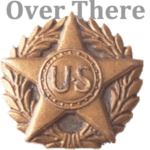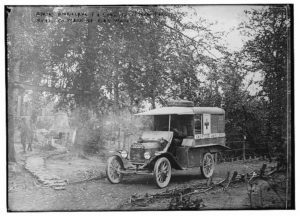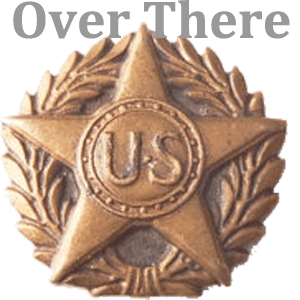 A series profiling American Jewish service in the First World War
A series profiling American Jewish service in the First World War
2nd Lieutenant David Carb
From Ambulance Driver To Croix de Guerre

Fort Worth’s David Carb (1885-1952), a Harvard graduate, poet, and playwright, was among the idealists who romanticized the Great War. In June 1915, two years before America entered the conflict, he was among the dozens of literati to join the American Red Cross Ambulance Service. Headquartered in Paris, this ambulance corps, together with the American Field Service (AFS) operated cars and trucks retrofitted to serve as emergency medical vehicles.
Carb joined other well-known authors such as Ernest Hemingway, E.E. Cummings, and Somerset Maugham as ambulance drivers.
Many French were suspicious of the Yanks flooding in to help. But David Carb who spoke fluent French and whose grandparents were natives of Alsace-Lorraine, received a warm welcome. The Allied military considered them as elite units and treated them in a manner comparable to officers and gentlemen. The drivers transported wounded soldiers to field hospitals for triage and the most seriously wounded to evacuation hospitals. They bandaged wounds, splinted broken limbs and did their best to staunch bleeding.
These experiences did little to prepare David Carb for the horrors he witnessed at the Second Battle of Ypres. At 5 P.M. on April 22, 1915, the Germans opened up canisters of chlorine gas and let the fumes drift in the wind toward two French divisions of 10,000 men as they sat in their trenches. The green-yellow cloud filled four miles of trenches within minutes killing more than half the men. Soldiers who managed to climb out of their trenches were slaughtered by the Boche artillery or retreated in disarray, blinded by the gas.
When Carb and the other ambulance drivers arrived at the grizzly scene corpses lay everywhere. Those still alive clutched their throats and rolled on the ground in agony and struggled for breath with a bloody froth of foam rolling across their blue lips. Carb’s ambulance ran back and forth to the field hospitals as fast as it could, plowing right though hedgerows and over ditches to get help for the wounded who still clung to life.
Once the United States entered the war in April 1917, the American Army absorbed the Ambulance services. Drivers, previously treated like officers were allowed to enlist, but with the rank of private. This did not sit well with the college-educated volunteers and most left.
David Carb did not depart the war. Instead, he went to officers’ school for the French Foreign legion and was commissioned as a 2nd lieutenant. Thereafter, as part of a French field artillery regiment he saw action adjacent to the American 3rd Division in Second Battle of Marne, Saint-Mihiel, the Argonne-Meuse among other battles. During a battle just inside Germany, he was wounded. For “his courage, enthusiasm and high morale,” he was awarded the Croix de Guerre (Cross of War), the prestigious French military decoration. Discharged in 1919 with the rank of 2nd lieutenant, he toured the USA at the request of the French government, speaking about his war experiences and encouraging Americans to think highly of the French and their wartime efforts.
Carb continued to teach college English at MIT, write plays, novels and poetry. He was Vogue Magazine’s drama critic for a decade. David Carb died of cancer in New York in 1952.
Note: A version of this article will appear in Dr. Julian Haber’s upcoming book The Yanks Are Coming Over There, Over There. The book is a joint project of JWV Post 755 and Fort Worth Jewish Archives. Funding provided by grants from the Dan Danciger JCC Hebrew Day School Supporting foundation and Tarrant County Jewish Federation.
Much information for this story was provided by archivist, Hollace Weiner.
Revised versions of They Were Soldiers in Peace and War Vol. I and Vol. II tell the stories of more than one hundred Jewish American Service men and women, WWI through our current conflicts and was published in 2015. They are available in our museum store.
